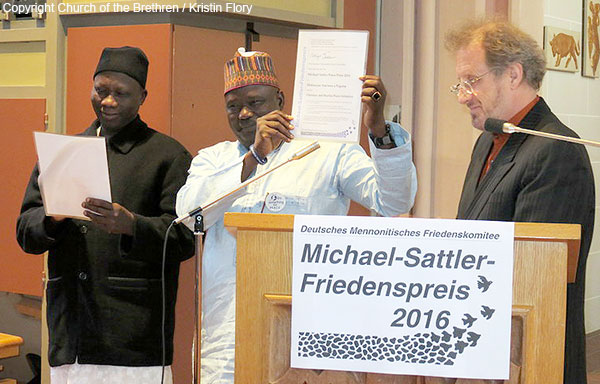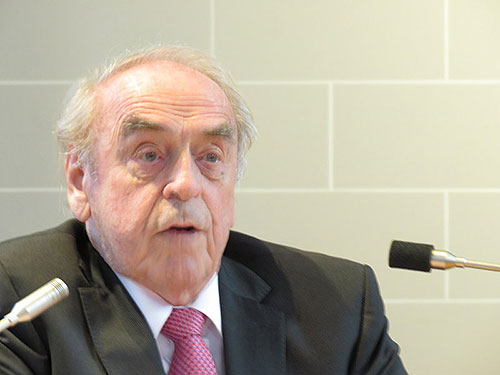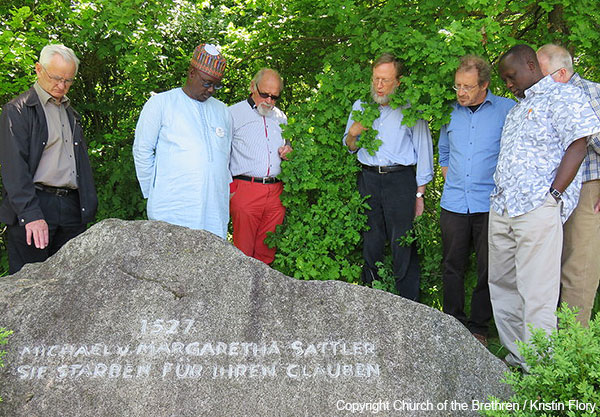By Kristin Flory

Ephraim Kadala of Ekklesiyar Yan’uwa a Nigeria and Hussaini Shuaibu of the Christian and Muslim Peace Initiative receive the Michael Sattler Peace Award from the German Mennonite Peace Committee (DMFK), on behalf of their respective organizations. The two men traveled from Nigeria to Germany to receive the award.
“Now I’m back to my roots!” said pastor Ephraim Kadala of Ekklesiyar Yan’uwa a Nigeria (EYN, the Church of the Brethren in Nigeria) as he waded in the Eder River in Schwarzenau, Germany. “This is where we come from!”
The German Mennonite organizers of the 10-town tour through Germany for Kadala and Hussaini Shuaibu of the Christian and Muslim Peace Initiative (CAMPI), remembered that the first Brethren had been baptized in Schwarzenau, and drove the two Nigerians there to visit the river and the Alexander Mack museum and mill.
EYN and CAMPI receive award
The two men were in Germany on behalf of EYN and CAMPI to receive the DMFK’s Michael Sattler Peace Award, which was presented on May 20 in Rottenburg/Neckar. The German Mennonite Peace Committee (DMFK) bestows the award to people or groups whose work is committed to nonviolent Christian witness, to reconciliation between enemies, and to promotion of interfaith dialogue. The award is named after the martyred 16th century Christian Anabaptist Michael Sattler and bestowed in Rottenburg/Neckar on the date of his execution.
EYN and CAMPI were chosen for their adherence to the peace message of the gospel and rejection of calls for retribution despite the Boko Haram insurgency in northeast Nigeria. The DMFK release about the award noted that EYN teaches its members and especially the younger generation the biblical messages of peace and reconciliation, establishing contacts with Muslims and mosques who are willing to dialogue. With its programs for peace and justice, EYN works against the economic and political causes of the violence. They thus not only reject violent confrontation–there are many examples of love of enemies–but also contribute actively to the creation of peaceful co-existence of Muslims and Christians.
Award ceremony celebrates a strong faith
After a 2-week tour of about 10 German cities where they spoke in mosques, Mennonite congregations, Protestant churches, and with the German Fellowship of Reconciliation, the Nigerians were the honored guests at the evening award ceremony in the packed Protestant church in Rottenburg. DMFK director Jakob Fehr introduced and thanked Kadala and Shuaibu, acknowledging that the trip had been long and tiring, “but we want to celebrate a small victory of nonviolence and the power of love over hate.” Both men had had to flee their homes in northeast Nigeria and both endured hardships during the violence.
One of the award committee members, Karen Hinrichs, also praised the Nigerians’ spirit of nonviolence. She admitted that “we here in Germany are weak in the faith” and sometimes doubtful, thinking that military responses may be the answer, and that selling weapons to Nigeria may be a solution. “We need to learn from Michael Sattler that violence is not the answer.” She reminded the gathering to not pay attention to what is reported in the media about Nigeria but to look at the reasons why people become terrorists or refugees, ask how the weapons get there, and finally “make a difference…. Peace grows from good relationships,” she said.
Wolfgang Krauss, a DMFK board member, shared Sattler’s statements at his 1527 trial about not resisting “when the Turks come” for it is written, “Thou shalt not kill. We should not resist any of our persecutors with the sword, but with prayer cling to God, that He may resist and defend.”
Rottenburg’s mayor reminded the meeting that the centuries-long German-French enmity had eventually been overcome and was an example of hope for Nigeria. He told the two Nigerians that they are the true messengers of peace and are models for all of us.
Jürgen Moltmann gives laudation
Renowned theologian and professor emeritus Jürgen Moltmann from Tubingen began his laudation: “With the utmost respect and reverence I stand before the church of the martyrs, both past and present: Michael and Margaret Sattler and the Anabaptist movement of the Reformation era, and now before the ‘Church of the Siblings,’* the Ekklesiyar Yan’uwa a Nigeria, who carried and carry the suffering of Christ today.” Moltmann spoke of the early Anabaptists, whom Martin Luther called “dreamers” and historians designate as the “left wing of the Reformation.” Moltmann considers the Anabaptists (re-baptizers, or adult baptizers) to be the only Reformation, solely because of faith.

Renowned theologian and professor emeritus Jürgen Moltmann from Tubingen gave a laudation for the Nigerian Brethren peace work.
From the Constantinian takeover of Christianity to the reformers who remained in the structure of the “holy empire,” Moltmann noted that the Anabaptists rejected the very basis of this state religion and “holy empire” by replacing infant baptism with believers’ baptism; they rejected military service (“because Jesus forbids violence of the sword”); they rejected use of oaths (“because Jesus forbids his disciples from all oaths”) and also participation in secular power. These references to Jesus are in the Schleitheim Confession that Michael Sattler composed in 1527, in which the Anabaptists rejected the state religion and the “holy empire” of that era, and were thus considered enemies of the state and persecuted. Because the Anabaptists were popular, the execution of Michael Sattler was especially cruel and used as a means of deterrence.
Sattler had been the prior at the well-known St. Peter Abbey in the Black Forest, Moltmann reminded his audience. Sattler was highly educated in theology and the classics. He joined the Baptists in Zürich and preached in Upper Swabia where he gained many followers and baptized them in the Neckar River. His Schleitheim Confession proves that he was of the same caliber as other well-known reformers of his day. Martin Luther freed the church from the “Babylonian captivity” of the pope, Moltmann said, but Michael Sattler freed the church from the “Babylonian captivity of the state.”
Moltmann welcomed Kadala and Shuaibu as brothers “who show us an example of the work for peace and against terror and death.” He went on to describe EYN, which in German is called the “Church of the Siblings,” as founded by the Church of the Brethren in 1923, and as a member church of the World Council of Churches. He noted that 178 of the schoolgirls abducted from Chibok are from EYN, and related that more than 10,000 EYN members had been killed and hundreds of churches destroyed by Boko Haram insurgents.
“In this dangerous situation, the EYN works for peace,” Moltmann said, “which means living and preserving life. Terror, that is killing and dying. Terrorism begins in the hearts and minds of people and therefore must be overcome in the hearts and minds of people. This is the language of peace, which creates life, and not of violence.
“It is good when the Christian and Muslim Peace Initiative tries to dissuade young men from killing and being killed, and wins them back to life,” Moltmann continued. “It is good when Christians and Muslims care for abused child soldiers, to heal them from the trauma of death. It is good when victims of injustice and violence learn paths out of pain and grief in the workshops of the church.
“Forgiving the people involved in Boko Haram and what they have perpetrated, means showing them the way to life, and to overcome the evil of hate and retribution that they have aroused in their victims,” Moltmann said. “Therefore, forgiving the perpetrators opens up the opportunity for conversion, and releases the victims from fixating on the perpetrators. We hope that the people of Boko Haram will not be destroyed, but that they will be converted to a life in peace.”
In his response, Kadala thanked “all who have supported us. We want to make a difference despite passing through terrible times. This is not about a magnanimous effort but a little effort. We are glad that far-away people saw what we’re doing and boosted our moral with this award. We are not only walking in the footsteps of Michael Sattler and other peacemakers, but also in the footsteps of Jesus Christ. We dedicate this award to the people who lost their lives in northern Nigeria and to the 219 girls from Chibok, and to all people of the world who love peace.”
CAMPI mediator and teacher Shuaibu agreed with Kadala, saying that “we’re on the same wave length” and added that he hoped that the next Michael Sattler will come from Africa. The two Nigerians presented a copy of Kadala’s book, “Turn the Other Cheek,” to the German Mennonite Peace Committee and to Moltmann.
The award ceremony was followed by a reception. In the large crowd of German Mennonites and Protestants were also members of the Church of the Brethren: Bryan Bohrer, a Brethren Volunteer Service (BVS) volunteer in Ravensburg, and Krista Hamer-Schweer, who lives near Marburg, as well as Kristin Flory of the Brethren Service Europe office.
Tour visits Sattler sites

The tour visited a stone marking the place where early Anabaptist martyr Michael Sattler was tortured, burned, and executed. The inscription reads: “1527, Michael and Margaretha Sattler. They died for their faith.”
A tour of Rottenburg was given on the following morning. Wolfgang Krauss related many stories from Anabaptist history. Sattler, his wife, and several others were arrested in nearby Horb but brought to be tried in Rottenburg, where there were no sympathetic Anabaptists. Krauss related the religious and temporal history of the region during the 16th century, showed the prison where Sattler was probably held, and the house of the executioner where he read from the minutes of Sattler’s court case. The tour travelled to the place outside the city gates where Sattler was tortured, burned, and executed, and where a memorial stone has been erected. It continued in the nearby town of Horb where Sattler’s congregation was located, and where he preached, but where there is no visible memory of him anywhere to be seen today.
On that Sunday, Ephraim and Hussaini participated in worship at St Peter’s Church in the Black Forest, where Sattler had been prior in the Benedictine abbey.
*The German Mennonite Peace Committee and Mission 21 (formerly Basel Mission) call the Church of the Brethren the “Church of the Siblings” in German (Kirche der Geschwister) because of EYN’s translation of its name as “Church of the Children of the Same Mother.”
— Kristin Flory of the Brethren Service Office in Geneva, Switzerland, staffs Brethren Volunteer Service in Europe.